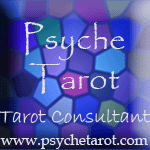By Psyche | January 17, 2010
 Standing Stone and Garden Gate is a new podcast started at the end of December 2009 by author and philosopher Brendan Cathbad Myers and Juniper, who blogs at Walking the Hedge. Their tagline is “the podshow for thinking Pagans and working Witches” and they’ve already put out three episodes.
Standing Stone and Garden Gate is a new podcast started at the end of December 2009 by author and philosopher Brendan Cathbad Myers and Juniper, who blogs at Walking the Hedge. Their tagline is “the podshow for thinking Pagans and working Witches” and they’ve already put out three episodes.
In Episode One Brendan and Juniper introduce themselves and the podcast. Also introduces the segments, such as Standing Stone, a segment dealing with philosophic themes – very appropriate for Brendan. Rants and Raves, which will be commentaries on current media, book reviews and other social commentary on the Pagan scene. Garden Gate, how to find the magickal in the mundane, every day practice. Ask Dr Expert, a segment where Juniper will try to stump Brendan on some bit of arcane lore. Continue reading »
By Psyche | January 11, 2010
 Speech in the Silence is a new Thelemic podcast put out by the ARARITA San Diego Thelema Group.
Speech in the Silence is a new Thelemic podcast put out by the ARARITA San Diego Thelema Group.
The first episode (Episode 1: Solstice in Capricorn, Year 105) aired on December 21st, 2009.
Their aims are straightforward and their focus seems tight:
The focus of Speech in the Silence podcast is on Thelema, Aleister Crowley, and Ordo Templi Orientis while also touching upon the subjects of magick, yoga, and initiation.
We will include lectures, music, interviews, discussions, and more. Also, we will feature readings of the Holy Books of Thelema and other important texts written by Aleister Crowley.
The first podcast briefly introduces Continue reading »
By Psyche | August 16, 2009
 Thelema NOW! is a new podcast put out by the OTO’s US Grand Lodge. It was launched a few weeks ago, and is, as far as I’m aware, the first Thelemic podcast since John Crow’s Thelema Coast to Coast closed shop in 2007.
Thelema NOW! is a new podcast put out by the OTO’s US Grand Lodge. It was launched a few weeks ago, and is, as far as I’m aware, the first Thelemic podcast since John Crow’s Thelema Coast to Coast closed shop in 2007.
In the first episode the host, Frater Puck, interviews Richard Kaczynski, whose latest book is The Weiser Concise Guide to Aleister Crowley .They also discuss other recent projects, including an upcoming an edited and annotated edition of Aleister Crowley’s Sword of Song, a fifty page article on the Thoth Tarot which will be included in an upcoming anthology titled Tarot and Culture, an expanded edition of Perdurabo which will include another 50-100 pages of material based on new research since the book was first published, among others. Continue reading »
.They also discuss other recent projects, including an upcoming an edited and annotated edition of Aleister Crowley’s Sword of Song, a fifty page article on the Thoth Tarot which will be included in an upcoming anthology titled Tarot and Culture, an expanded edition of Perdurabo which will include another 50-100 pages of material based on new research since the book was first published, among others. Continue reading »
By Psyche | April 25, 2008
In reply to [cref 155], Deo asks a number of important questions:
I’m interested in the question: Is there such a thing (ontologically/metaphysically) as magic? The magical models perspective allows us to assume that there is, and it then outlines ways to conceptualize the methods and effects of various systems/ritual styles. With regard to magical models, my question is necessarily less pragmatic: What is the mechanism, if any, that delivers the effects from a ritual framed by any of the given models? Is this mechanism identical with magic? In other words, does magic deserve to be an ontological category? If not, then it’s metaphysically uninteresting and a worldview that lacks it can still be a complete worldview.
This brought to mind a post made by John Crow in his blog Treasure House of Pearls earlier in the year titled “Magic and the Categories of Discourse” where he wrote: “Until about 900 years ago, magic practice was simply done with very little thought as to why it works or how it works. It was just done and it just worked.”
Thinking about why and how magick works is relatively new. The psychological model is favoured by many, especially when explaining it to those outside the circle (so to speak). The question of what we mean when we say “magick” seems even more elusive. It’s a question of meaning.
Jordan Peterson in Maps of Meaning describes it this way:
The automatic attribution of meaning to things – or the failure to distinguish between them initially – is a characteristic of narrative, of myth, not of scientific thought.
However, Peterson suggests that to trivialize Continue reading »
By Psyche | April 24, 2008
Last week we looked at definitions of magick and saw that most of them fail to pin down what’s meant.
There was a lot of great feedback in the comments section. Some of them are too detailed to post, but I’d like to highlight a few responses, and do encourage you to check out the rest.
Nysidra said:
I like Crowley’s definition (and others that have said similar) very much. You want. You work. You get. There are plenty ways to go along that path, and magick is one of them. And yes, it’s subjective, everything begins subjectively. All actions, all physical manifestations, begin as a thought, a spark, a desire.
Magick does that on a grand scale, getting your mind right, your desires aligned, in order to create objective changes.
I like the suggestion here that magick requires discipline and self-awareness. In my experience, these have been central to Continue reading »
 Standing Stone and Garden Gate is a new podcast started at the end of December 2009 by author and philosopher Brendan Cathbad Myers and Juniper, who blogs at Walking the Hedge. Their tagline is “the podshow for thinking Pagans and working Witches” and they’ve already put out three episodes.
Standing Stone and Garden Gate is a new podcast started at the end of December 2009 by author and philosopher Brendan Cathbad Myers and Juniper, who blogs at Walking the Hedge. Their tagline is “the podshow for thinking Pagans and working Witches” and they’ve already put out three episodes.





